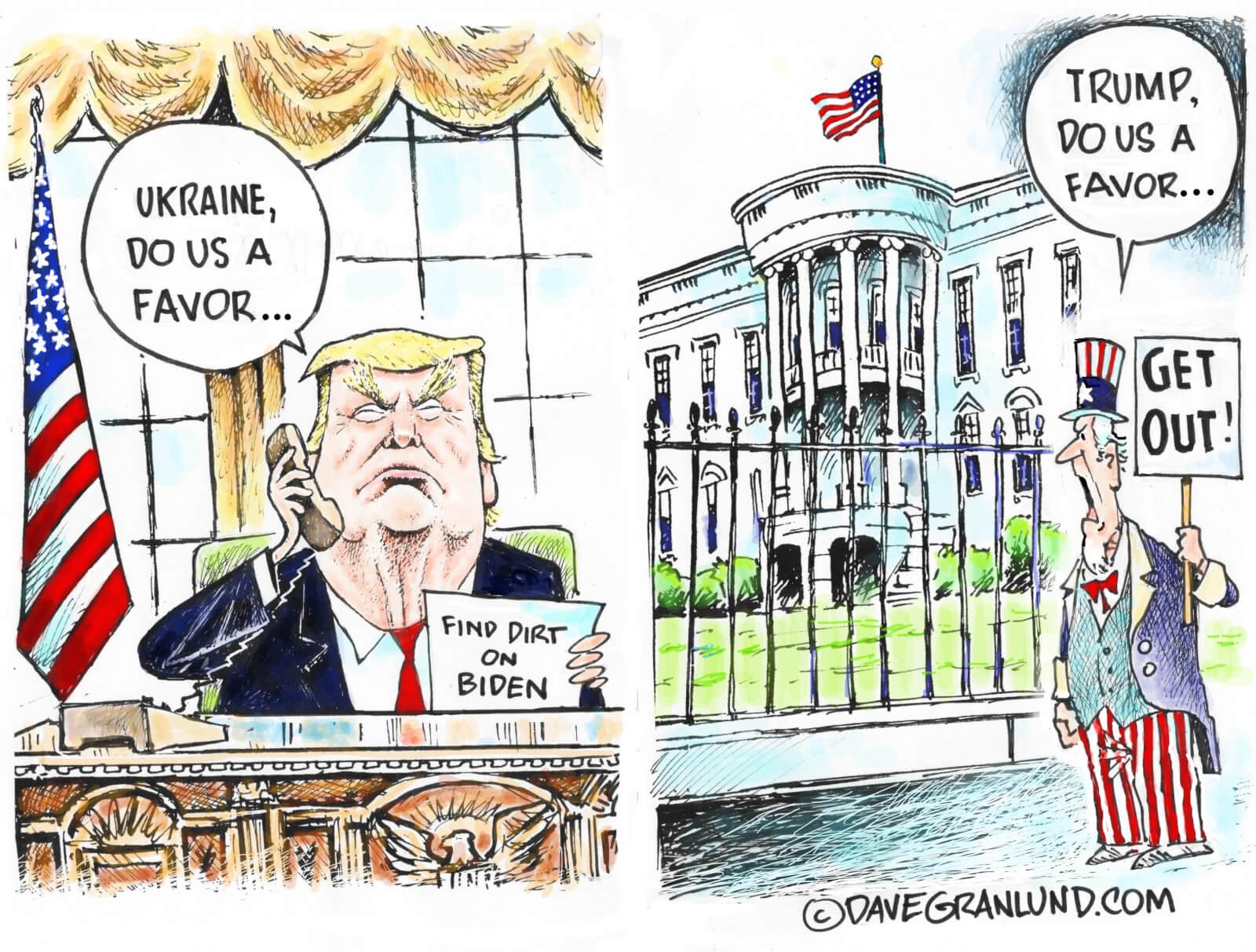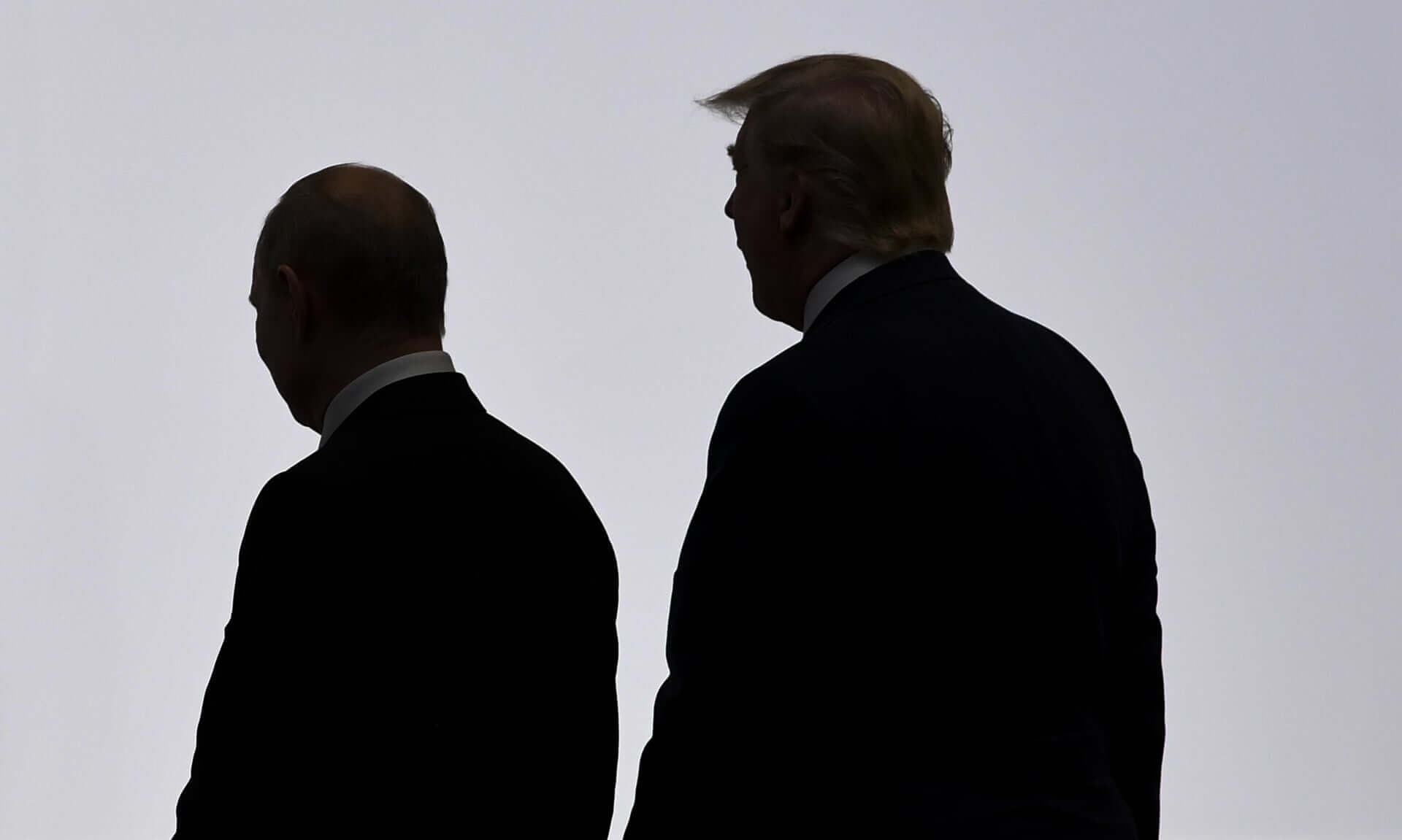Since the disintegration of the Soviet Union, Ukraine has been at the centre of a power struggle between the Kremlin and the West. While Russia views Ukraine as its own geopolitical backyard due to its linguistic and cultural ties, the US-led West sees the country not just as a strategic foothold for commerce, but as a safeguard against Russian imperialism.
In its ongoing conflict with Russia post the annexation of Crimea and the Donbas, Ukraine has been heavily reliant on aid from the US and the EU, who perceive the rise of Russia as a major security threat. The former Soviet state is now at the core of US President Donald Trump's ongoing impeachment investigations, with Trump accused of extorting Ukraine President Volodymyr Zelensky; this fits neatly into Russian narratives of Ukraine being a Western puppet.
Trump's odd pro-Russia and anti-Ukraine stance is a stark contradiction to his predecessors in the Oval Office and has raised widespread concern over stability in Ukraine's conflict zones. The uncertainty of American support has left Kyiv in a lurch, especially as Zelensky continues to cautiously push for the reintegration of the Donbas. Most recently, he lifted certain restrictions on the movement of Ukrainian goods across the frontline in the hope that it eases some tensions. This whole mess then begs the question–could an eventual 'Trumpeachment' worsen Ukraine-Russia relations?
Source: Times Record
For Russia, the biggest challenge in establishing itself as a Eurasian authority is the existence of an independent Ukraine. Traditionally, Russians have considered parts of Ukraine as their own territory, and there are many Ukrainians in the East and South who identify as Russian. In Soviet times, Eastern Ukraine was the hub of defence manufacturing and a heavy industrial sector that had close ties to Russia even after independence. Therefore, soon after the removal of President Viktor Yanukovych following the Euromaidan protests, Russia annexed Crimea and claimed it as its own territory in February 2014.
A few months later, this escalated into an armed conflict between pro-Russian separatists and the Ukrainian government in the Donbas. Following the landslide victory of Zelensky, who is pro-EU, support from the US and the EU has been crucial in backing Ukrainian troops in their fight against Russia’s occupational forces.
Since 2014, the US Government has provided more than $1.6 billion in aid to Ukraine. Former President Barack Obama believed that Ukraine’s non-NATO status would continue to make it vulnerable to Russian domination, and thus provided aid for security assistance, despite not considering Ukraine as a core concern for American national security.
Trump’s administration has completely moved away from this line of thought. In 2018, the US began to send lethal weaponry like Javelin missiles as well as military equipment like night-vision technology, sniper rifles, counter-artillery radar systems and forms of medical assistance.
According to Mariya Omelicheva, a professor at the National Defense University, the Donbas frontline “would have been moved further west into Ukraine, and Russia-backed rebels would have controlled more Ukrainian territory” without American aid and military training.
Ironically, despite claims of Russia being a threat to national security, Trump’s foreign policies have worked in favour of the Kremlin. The leader has introduced a sense of discord within the NATO, as he has criticized allied states for spending less on defence, even questioning the founding principle of the NATO–Article 5–which binds all signatories to collective defence. Russia has always seen NATO as an existential threat, and this friction can be construed as a win for the nation.
Furthermore, Trump’s affinity for Vladimir Putin also raises questions about his intentions. At this year’s G7 summit, he advocated for the reinstatement of Russia into the group for talks on security issues in Syria, Iran, and North Korea.
There is also the larger debate dating back to the 90s, about how directly relevant the Ukrainian situation is to US national security. However, Trump’s erroneous decision to withhold over $400 million in aid to Ukrainian troops in 2019 in an attempt to coerce Zelensky into carrying out private investigations on political rival Joe Biden–over the infamous July phone call–severely undermines the US-Ukraine relations.
In a Congressional testimony, American diplomat David Holmes claimed that the President’s ambassador to the EU said that Trump does not “give a shit about Ukraine”. He was also quick to judge the Ukrainian system as a corrupt one and has displayed a bigoted disdain for Ukrainians, calling them all “terrible people”.
Moreover, Putin seems to be enjoying this power lacuna, as Zelensky’s leadership has now come under scrutiny. Pro-Russian parties in Ukraine have echoed calls to open investigations with Ukraine. This entire impeachment exercise has fed into existing Russian suspicions that its neighbour is a puppet of the US. William Taylor, a top US diplomat to Ukraine, said, “The Russians […] would love to see that humiliation of President Zelensky at the hands of the Americans.”
This scandal has come at a crucial crossroads in Ukraine-Russia relations. Zelensky is attempting to enter peace talks under pressure from the EU, but it is highly unlikely to gain any traction with Russian authorities. It is an unfortunate reality that Russia’s view of Ukrainian power rests so strongly on the former’s relations with the US, and the revelation of a failure in leadership in both countries only works in Putin’s favour.
If Trump’s impeachment goes through and the Senate votes in favour of his removal, it is most likely that Vice President Mike Pence would be his successor. There are allegations against Pence, too, for being aware and involved in Ukrainian scandal.
At the same time, Pence has always displayed a more rigid stance towards Russia, despite Trump and his inconsistencies. Hence, while there is a slim likelihood of Pence having a different view about Ukraine than Trump, there is a high likelihood that he will increase sanctions on Russia to try and reclaim the American position.
If Trump stays in office, it seems unlikely that Kyiv-Washington relations can recover before the next US Presidential election, presuming Trump loses his incumbency. Considering the many similarities between the rise of Trump and Zelensky–from television stars to heads of state–it is rather unfortunate that the relations of two like-minded countries with shared interests have been compromised.
Hence, the future of Ukraine’s position in its war against Russia remains grim in all scenarios, as only a change in ideology at the White House can fix the current situation.
Reference List
Borger, J. (2019). Trump personally kept pressure on Ukraine, says impeachment inquiry witness. Retrieved 4 December 2019, from https://www.theguardian.com/us-news/2019/nov/16/trump-personally-kept-pressure-ukraine-impeachment-inquiry-witness-david-holmes-diplomat
Brennan, D. (2019). Trump's foreign policy is "the greatest thing that's ever happened" to Putin and Russia, intelligence expert says. Retrieved 4 December 2019, from https://www.newsweek.com/donald-trump-foreign-policy-greatest-vladimir-putin-russia-intelligence-expert-malcolm-nance-1471439
Carpenter, M. (2019). Ukraine’s Divided House Still Stands. Retrieved 5 December 2019, from https://www.foreignaffairs.com/articles/ukraine/2019-12-04/ukraines-divided-house-still-stands
Charlton, A., & Vlasov, D. (2019). Why Ukraine matters, and not only to Trump and his rivals. Retrieved 4 December 2019, from https://apnews.com/33afe965efd04a3e9be60c1aa5df3f80
Dickinson, P. (2019). It’s counterintuitive but Trump impeachment inquiry may help Ukraine - Atlantic Council. Retrieved 4 December 2019, from https://www.atlanticcouncil.org/blogs/ukrainealert/its-counterintuitive-but-trump-impeachment-inquiry-may-help-ukraine/
Friedman, U. (2019). America Hasn’t Always Supported Ukraine Like This. Retrieved 4 December 2019, from https://www.theatlantic.com/politics/archive/2019/11/how-vital-us-military-aid-ukraine/602407/
Kim, L. (2019). The View From Moscow On The Trump Impeachment Inquiry. Retrieved 4 December 2019, from https://www.npr.org/2019/11/27/783283307/the-view-from-moscow-on-the-trump-impeachment-inquiry
Lane, D. (2016). The International Context: Russia, Ukraine and the Drift to East-West Confrontation. International Critical Thought, 6(4), 623-644.
McFaul, M. (2019). Trump’s Gift to Putin. Retrieved 4 December 2019, from https://www.foreignaffairs.com/articles/russian-federation/2019-10-23/trumps-gift-putin
Michel, C. (2019). What the Impeachment Inquiry Means for the U.S. Relationship With Ukraine. Retrieved 4 December 2019, from https://www.worldpoliticsreview.com/articles/28343/what-the-impeachment-inquiry-means-for-the-u-s-relationship-with-ukraine
Vesoulis, A., & Bergengruen, V. (2019). How Russian President Vladimir Putin Emerged as a Winner in President Donald Trump's Impeachment Hearings. Retrieved 4 December 2019, from https://time.com/5739982/putin-winner-impeachment-hearings/
Welt, C. (2019). Ukraine: Background, Conflict with Russia, and U.S. Policy. Congressional Research Service. Retrieved from https://crsreports.congress.gov
Image Source: The Guardian

